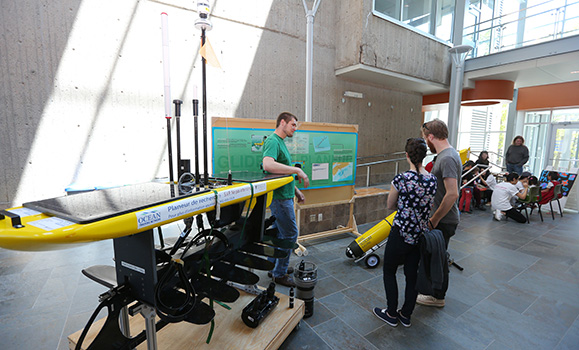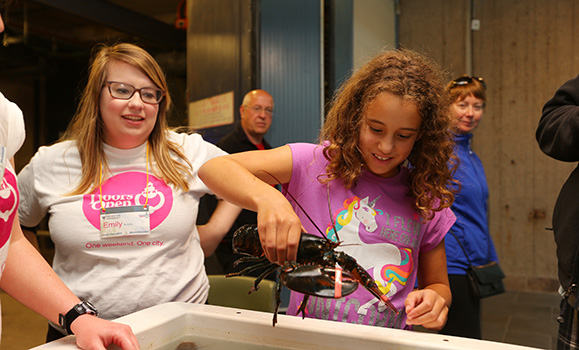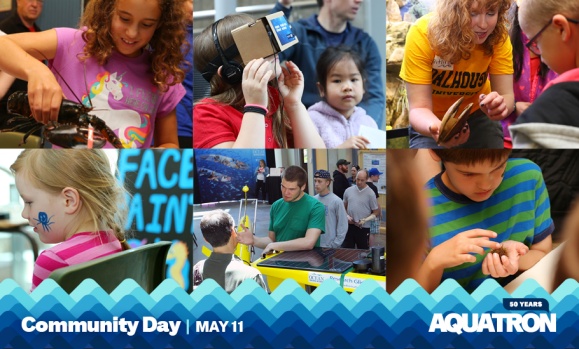ÔÇťA part of everybody wants to be David Attenborough,ÔÇŁ says John Batt, who leads DalhousieÔÇÖs Aquatron ocean research facility, evoking the hushed-toned natural historian who voiced the celebrated ocean documentary Blue Planet.╠ř
ÔÇťThatÔÇÖs the attraction of╠řAquatron Community Day. This is a chance to follow up on that dream and spend time with researchers who explore our underwater world and can bring it to life in really exciting ways.ÔÇŁ
Marking the 50th╠řanniversary of DalhousieÔÇÖs Aquatron, CanadaÔÇÖs largest university-based ocean research facility, the open house event on May 11 from 1 to 4 p.m. will gather ocean researchers from across ║┌┴¤│ď╣¤═°to share their work. Programmed with families in mind, Batt says the event will include something for every ocean enthusiast, from face painting and touch tanks to ocean glider demos and tours of the Aquatron, providing an engaging introduction to the world of ocean research.╠ř

Discover the latest in high-tech ocean monitoring.
With its global reputation, the Aquatron attracts scholars and students from around the planet and across fields to study and collaborate. Batt says that the community day event will offer an opportunity for the public to dive into conversations with researchers and students about their work and the chance to experience it firsthand.
Touchy-feely
ÔÇťWe're sort of following the touchy-feely principle,ÔÇŁ says Batt. ÔÇťYou know, kids like to touch things, so we'll have oysters there, we're going to have seaweeds there, we'll have a touch tank. It's going to be sensory engaging, you can see it, hear it, touch it, feel it, smell it. It's going to hit your senses.ÔÇŁ

Get up close and personal with ocean life.
The Aquatron is comprised of a series of specialized tanks holding a combined volume of more than 2 million litres, and a wide variety of smaller tanks, research spaces and equipment. It allows scientists to artificially create any ocean or freshwater environment, mimicking temperatures, chemical composition, and currents. It has been a temporary home to countless ocean species from sea turtles and sharks to seahorses and a number of endangered species.╠ř
ÔÇťWhen people ask what research weÔÇÖve done in the Aquatron, I say itÔÇÖs a shorter list to describe what we havenÔÇÖt done,ÔÇŁ says Batt. ÔÇťPeople say, ÔÇśOh, I bet you've never had a robot in thereÔÇÖ. I say, we call that Tuesday. We've turned it into the Great Barrier Reef in the middle of winter, and we've turned it into a semi-arctic environment in the summer. We can do just about anything to support marine scientists with this facility.ÔÇŁ
Splashy science showcase
Batt and ocean science students will lead attendees on tours through the expanse of the Aquatron and regale them with stories of the research that has and continues to take place, including the current work to save the Atlantic white fish, a species on the verge of extinction.╠ř

Dr. Paul Bentzen and John Batt at the edge of the Aquatron tank holding the endangered Atlantic White Fish. (Danny Abriel photo)
ÔÇťWe'll be talking about our Atlantic white fish project, where we have the largest population of Atlantic white fish in the world. There are only two populations, the wild one down in╠řPetite Riv├Ęre and the one in the Aquatron,ÔÇŁ says Batt, who is working with researcher Dr. Paul Bentzen to breed them for an eventual release in October.╠ř
The event will also bring out partners who use the Aquatron as an essential part of their research programs, including CanadaÔÇÖs Department of Fisheries and Oceans, whose species at risk researchers are collaborating on the white fish project. Parks Canada will also be represented and presenting a video display featuring their work with the Aquatron team to support wild salmon stocks and releasing the fish into the wild in Cape Breton.╠ř

Atlantic white fish at home in the Aquatron.
ÔÇťThis is a great chance for people to come in and talk directly to researchers and ask them questions about endangered species and climate change, and to learn about shellfish, aquaculture, seaweed aquaculture, and cutting-edge new things industry is doing. ItÔÇÖs really exciting.ÔÇŁ

